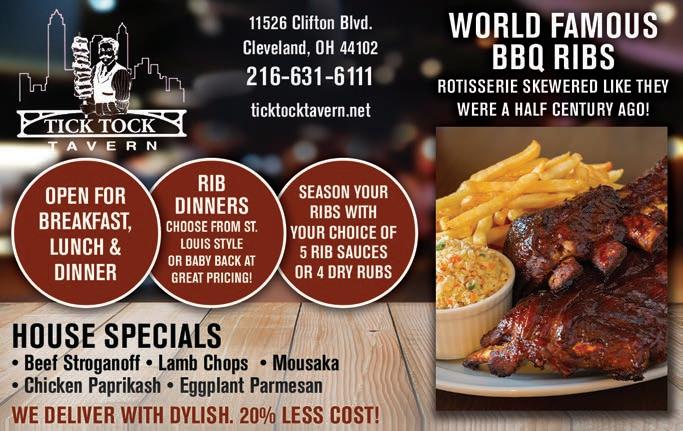
16 minute read
Upfront
CLEVELAND CONCERT VENUES ANNOUNCE MANDATORY VAX POLICY
MORE THAN A DOZEN REGIONAL
Advertisement
music clubs and theaters including the Agora, the Beachland, the Bop Stop, Grog Shop, Happy Dog, Jilly’s Music Room, Mahall’s, Music Box, Musica, the Nightlight, the Rialto Theatre, Westside Bowl and the Winchester, have jointly decided to require proof of vaccination or negative COVID-19 tests for entry into their venues.
“Many national touring bands are now requiring that venues have a policy of only vaccinated staff members on site during their show and that patrons also prove they have been vaccinated or are COVID negative,” says Beachland Ballroom & Tavern co-owner Cindy Barber in a press release. “And some may still require masks, but this policy may help keep our schedules mostly intact. As Northeast Ohio venues, we all want to have the same base policy so our fans can understand and feel protected when they come out to support live music.”
The new policy will be in full effect no later than Tuesday, Sept. 7. Patrons will be required to show proof of vaccination or proof of a negative test within 48 hours of entry at venues throughout Northeast Ohio. These restrictions will remain in place indefinitely and are subject to change with current public health conditions and as guidance is reevaluated.
“As regional venue owners and operators, we are united in prioritizing the health and safety of our patrons, staff, artists — and our businesses,” says Jilly’s Music Room owner Jill Bacon Madden. “We were thrilled to reopen and invite people to gather and celebrate live music, performances, and film again. The rise in COVID cases coupled with vaccine hesitancy is a threat to the live entertainment economy. We are committed to taking positive action to get through and rise above it.”
Happy Dog co-owner Sean Watterson agrees with Madden.
“Venues locally and across the country just re-opened after over a year of being closed due to COVID safety concern,” he says. “We need to do what we can to operate safely and realize these are imperfect solutions to problems that are largely out of our control. We are working with local partners on solutions to continually improve safety for audiences, performers and staff, and we recognize that, as conditions change, we will need to adapt and adjust our efforts.”
Acceptable documentation may be a physical or digital copy of a COVID-19 Vaccination Record Card or other proof as permitted locally that can be matched with a Driver’s License or State ID. A test result must be in the form of written documentation. Guests are strongly encouraged to wear masks regardless of vaccination status except while actively eating and drinking.
The Agora, owned by AEG Presents, will accept negative Covid tests through Oct. 1, but only vaccinations afterward. -Jeff Niesel

Owners of local clubs outside the Happy Dog.
Emanuel Wallace
Former Mobster who Scammed Flats East Bank with Phony Restaurants Pleads Guilty to Federal Charges
Frank Capri, a former mobster turned government witness turned developer who scammed the East Bank of the Flats with Toby Keith and Rascal Flatts-branded restaurants that never opened, pleaded guilty last week in Arizona to federal charges of conspiracy to commit wire fraud and tax evasion.
Capri’s scheme, which began in 2011 and continued through 2015 both in Cleveland and around the country, involved inflating revenue projections for the planned restaurants to convince developers to increase tenant improvement funds for the properties. Capri’s company would then reduce actual construction costs — including creating fake contractors, acting as their own contractor, creating false documents, submitting fake invoices — to pocket the difference between the developer’s outlay and their costs.
Twenty to 40 franchises were sold to developers, but most never opened after lengthy, intentional construction delays. Capri’s company (Boomtown) failed to pay taxes, racked up hundreds of thousands of dollars in tax liens and faced some $30 million in lawsuits. (That number had climbed to $65 million in judgments by 2017.)
The Feds say between 2011 and 2015, Capri collected some $12.9 million for Toby Keith restaurants that never sold a thing. Meanwhile, Capri transferred millions from Boomtown’s bank account to his personal one, spent at least $2.7 million of the illegal funds on jewelry alone, and underreported his income
UPFRONT

to the IRS by more than $3 million over the course of three years.
Once he’d taken the developers for all he could with Toby Keith’s restaurant, Capri went back to the well after securing another deal to open Rascal Flatts-branded bars and restaurants around the country, deploying a similar scheme, and in many cases, deploying it on the same developers he had just bilked.
Cleveland was one of those cases, as the East Bank announced in 2016 it would be welcoming the Rascal Flatts Bar and Grill.
Because Capri hid his ties to the new company so well, few were any the wiser, and Capri managed to collect more than $5 million in tenant improvement funds for developers for another batch of restaurants that once again never opened.
The developers of the East Bank of the Flats eventually found out they were dealing with Capri again when a man named Ray Rostho, who owned an Arizona construction company and who was hired by Capri to front the Rascal Flatts project here and in other cities, told them at one point that they really ought to just talk to Frank Capri if they had concerns, because it was his project.
“I said, ‘You’re going to have to call Frank Capri,’” Roshto told the Arizona Republic. “He was totally surprised. He shouted out, ‘Frank Capri!’ Then he said it again: ‘Frank Capri.’ And I said, ‘Yeah.’”
He was indicted by a federal grand jury in January 2020 on 16 charges. He pleaded guilty to two of them last week.
Capri faces up to five years in prison and three years of supervised release after. He’ll be sentenced in January 2022. -Vince Grzegorek
City Council Votes, at Last, to Allow Public Comment at Meetings
Cleveland City Council formally voted last week to amend its rules and allow public comment at its Monday meetings. The two minor amendments are little more than tweaks to existing language, but a framework is now in place. Council expects to begin allowing comment at its Sept. 20th meeting.
The first change says that “in accordance with rules and procedures established by the Clerk of Council, any person may be heard during that portion of a regular meeting set aside for public comment.” The second change sets aside that portion, a regular slot in the meetings’ order of business.
Activists from Clevelanders for Public Comment (CPC) were incensed when they saw a draft of the language, stunned that Council President Kevin Kelley had taken months to move on what amounted to little more than line edits.
But Council sent out a press release later with additional details on the procedures themselves. Though these procedures have not been finalized, they contain many of the provisions that CPC was agitating for from the beginning.
According to the release, Clerk Pat Britt’s procedures will allow anyone to register to make a comment — not just Cleveland residents — and allow commenters to speak on any topic, not just those related to agenda items. Registration can be completed online, by paper form or by phone and must be submitted before 2 p.m. on the day of the council meeting. The first 10 registrants will be granted speaking time, a maximum of three minutes each.
All that is indeed aligned with what CPC had proposed, but organizers say the council vote is still a head scratcher.
“It’s strange that they’re not voting on these procedures,” Jessica Trivisonno, who drafted the ordinance and rule change that Clevelanders for Public Comment proposed, told Scene. “They’re voting on the Clerk being allowed to create procedures. It’s not clear to me how those procedures are created, how they can change over time, and whether she even has to come before council if they are to change in the future.” (Before the council vote, Ward 3 councilman Kerry McCormack introduced an amendment, drafted by CPC, that would give council oversight over the clerk’s rules.)
The second problem CPC identified is that the procedures don’t apply to committee meetings. As before, those who wish to comment at committee meetings must make a request to the committee chair, and it’s up to the committee chair whether or not to approve or deny the request.
“Tony Brancatelli and Kevin Kelley have said again and again that they already have public comment at committee meetings, and that’s really where the work of council gets done,” Trivisonno said. “Yet they’ve made no effort to make that process clearer through this legislation — it’s not legislation — through whatever this is.”
Nora Kelley, another one of CPC’s organizers, echoed Trivisonno’s complaints in comments to Scene.
“The first issue is that they’re essentially punting to the unelected Clerk of Council,” she said. “And there’s no guarantee that these rules won’t be modified. The second is the committee meetings. From a drafting standpoint, the rule is somewhat sloppy and may open the city up to exposure by making public comment at the discretion of the committee chair. There’s no basis for them to accept or deny public comment. Like what criteria are they using?”
The fear, of course, is that committee chairs will simply deny the requests of comments or commenters they don’t like.
“From our perspective, this should be a straightforward, easy process, and virtually every other city already has it in place,” Nora Kelley said. “The fact that it’s taking months to develop is concerning. They kept saying that this isn’t like turning on a light switch, except for it is.”
But the vote last week was nevertheless regarded as a significant step forward by council members who had supported the legislation from the start and by activists who’d done the lion’s share of the work.
“This is a huge win for democracy, but the fight for residents to comment at city council committee meetings has really just begun,” said Michelle Jackson, a member of CPC, in a press release. “Policy-making happens in the committees and that is where the voice of the public can have the most impact. But we now have the model for how to fight city hall and win!” -Sam Allard

Council President Kevin Kelley.
Sam Allard
Former Mayor Mike White Endorses Justin Bibb for Mayor
Having not campaigned for anything or anyone since 1997, former Cleveland Mayor Michael R. White enthusiastically endorsed 34-year-old nonprofit executive Justin Bibb for mayor Wednesday morning.
Michael White became mayor at age 37 and served three terms from 1990 to 2001. For the past


FEATURE UPFRONT
twenty years, he has been largely absent from public life, devoting his energies to an alpaca farm and winery in Newcomerstown, Ohio. In 2017, though, he coordinated a last-minute Super PAC with regional big-ticket financiers Al Ratner, Fred Nance and Dominic Ozanne to guarantee Frank Jackson’s victory against Zack Reed.
Wednesday, in remarks delivered at Bibb’s childhood home on the Southeast side, White said that Bibb was “worthy and ready” for the job he once held, and he rebuffed those who criticized Bibb for his youth and lack of political experience.
“I’ve heard all the chatter,” White said. “’He hasn’t been in politics that long.’ Well, look what politics has got us. Look what business as usual has got us. We don’t need business as usual. We need a new day in Cleveland. We need more, we need it faster, and we need it to happen today.”
White said he made the decision to endorse Bibb for all the neighborhoods of Cleveland and for the people who live there. He described Bibb as the product of his mother’s and grandmother’s wishes and said that he “checked all the boxes” to get where he is today, the same boxes that White himself checked before his mayoral run in 1989, in which he upset then council president George Forbes.
Standing before a crowd that included former GCP President Joe Roman and Forest City Enterprises’ erstwhile Chairman and CEO James Ratner, Bibb said he was honored to accept White’s endorsement.
“When I launched this campaign, they told me I had to wait my turn,” Bibb said, “that I didn’t know how City hall operated. But for the last seven months, we’ve shown this city that we are ready, that we’re not waiting on anybody.”
Hours later, at the West Side Market, candidate Dennis Kucinich was endorsed by former Cleveland area congresswoman and city councilwoman Mary Rose Oakar.
-Sam Allard
“Dennis the Menace” Comic from Anti-Kucinich PAC Is Gift to Kucinich Campaign
Last week, a full-color, eight-page comic booklet arrived at the doorsteps of thousands of Cleveland voters. Paid for by something called the “Citizens for Change” Political Action Committee, the booklet parodied the “Dennis the Menace” comic strip in its attempts to persuade voters not to vote for Dennis Kucinich in the upcoming Cleveland mayoral primary on Sept. 14.
“Dennis is a menace as mayor,” page two proclaimed. “Dennis is a menace on crime,” the next page announced. “Dennis is a menace in it for himself—not Cleveland.” etc.
The booklet is heavy on text, quoting extensively from media reports that documented the tumult of Kucinich’s first mayoral term, (1978-1979). It highlighted controversies with the police department, the financial fallout of his decision not to sell Muny Light, and his recent appearances on Fox News, among other things.
The Kucinich campaign issued a press release when they learned of the impending publication.
“The anonymous attacks of the secretive ‘Change’ political action committee reveal the true character and motivations of those who contribute and those who benefit from their reprehensible lies and dishonest misrepresentations,” it read. “Tactics such as these should be condemned by every decent, honorable person seeking to be a leader in the city of Cleveland.”
The release noted that the PAC’s tactics were “strikingly similar” to the Friends of Kevin Kelley PAC, which has created the anti-Kucinich website clevelandsworstmayor.com. They are also similar to the tactics of the Democratic Majority for Israel PAC, which flooded Northeast Ohio with anti-Nina Turner ads in the leadup to this month’s OH-11 primary.
The Citizens for Change PAC describes itself as a political action committee “dedicated to prevent Dennis Kucinich from becoming Cleveland’s mayor again.” Its financial backers are unknown, but its address is listed as Beachwood, Ohio.
At the most recent mayoral debate Tuesday, Kucinich used his closing statement to co-opt the “Dennis the Menace” attack line and turn it into a battle cry:
“Yes, I am a menace,” he said, “I’m a menace to violent criminals who are running in the streets; I’m a menace to banks who redline, I’m a menace to utilities which price gouge people; I’m a menace to crooked politicians who steal from the taxpayers and to those who look the other way.”
Kucinich has now created a mailer of his own that continues to play up this theme: “A menace









UPFRONT
to banks who redline,” the mailer reads. “A menace to utilities who price gouge. A menace to crooked politicians. A menace to violent criminals. A menace to a wasteful, lazy City Hall.” -Sam Allard
How to Help Afghan Refugees Coming to Cleveland
The Refugee Response, a Cleveland nonprofit that helps resettled families in the area, announced Monday that it has completed 220 humanitarian parole applications for Afghan refugees and has enough money to complete 30 more.
Each application costs $575, and the group continues to collect donations to help even more Afghans fleeing the crisis in their homeland.
It’s just one of the organizations leading the effort to resettle them in Cleveland after the city was designated one of 19 possible landing spots as part of the special immigrant visa program.
Global Cleveland has a helpful list of places to which you can direct your money or time to support the effort.
“These are organizations that measure their service in decades; they measure it in centuries,” Global Cleveland executive director Joe Cimperman told WEWS. “We’ve seen this before. Every one of those communities that I mentioned [have brought] engineers, doctors, restaurants, homeowners, homebuilders. They make our community better by being here. I can tell you from all the communities that have come before, they inevitably make our general community better as a result of them being here.”
The three primary resettlement organizations include:
Catholic Charities Migration and
Refugee Services: (216) 939-3737 USCRI – Cleveland: (216) 781-4560, info@uscrioh.org US Together: (216) 456-9630
Specific needs include:
Volunteers
All three organizations need volunteers who can transport individuals and families to housing, from the airport, to do essential shopping at the store, or other necessary appointments. If you wish to volunteer services reach out to the above orgs.
Individuals and families coming will need legal help both before and after they arrive. If you are an immigration attorney, or any kind of attorney, please offer your services to the above organizations.
Housing
All three organizations need connections to provide housing. If you are a landlord or even own an Airbnb please reach out to the above orgs. If you know a landlord who may want to help, please share this information with them.
Jobs
Refugees need employment to successfully integrate. If you are a company or a business who is willing to hire refugees, please contact the above organizations.
Donations
All these organizations need donations of items like school supplies, winter clothing, and household items. Please call or contact each org to see what they need most.
-Vince Grzegorek
DIGIT WIDGET
372,624
Cleveland’s population, according to recently released 2020 Census Data. Population has now fallen in Cleveland for seven consecutive decades. City council will lose two seats, according to the city charter.
1890
The most recent census year when Cleveland’s population was lower (261,353) than it is today.
24,000
Boxes of “Chubb Crunch,” the Nick Chubb-branded cereal, sold in its first six days on the shelves, making it the fastest selling sports-branded food product from company PLB Sports & Entertainment.
$67.5 million
Total of cleanup work over the last three decades on the Ashtabula River, which this week was removed from the EPA’s list of most-polluted Great Lakes waterways.





